A woman with an alleged hoarding problem living in a Vancouver apartment in 2005 is partly liable for fire costs that caused $568,995 in damages and lost revenue, a B.C. Supreme Court judge ruled Jan. 12.
“I am satisfied (Angela) Chou created an objectively foreseeable and unreasonable risk of harm — and risk of fire in particular — to Langara and the other tenants by keeping her apartment in a near-hoarding state,” Justice Matthew Kirchner said in his decision.
The fire occurred Nov. 14, 2017 in a rental apartment complex at 57th Avenue and Cambie Street.
Court documents state the building is owned by Langara Gardens Holdings Ltd. and Langara Gardens; the company alleged Chou’s negligence "caused the fire and did so negligently." They sued for the cost of repairing the fire damage and for the rental revenue lost during the repairs.
Kirchner saw fire investigator Steve Baker’s photos taken after the blaze.
“I am satisfied they provide a fair indication of the state of the unit before the fire. Obviously, the fire caused damage and disarray in the living room, but photos of other parts of the unit clearly indicate it was in a near-hoarding state,” he said.
The judge said the inspector reported the apartment “was densely occupied with domestic possessions stacked with depths ranging from two to four feet. He said a walkway was cleared through the living room but apart from this, areas not occupied by furniture were covered in “several feet of stored domestic materials.”
The apartment was rented to Danny Chen and Angela Chou in 2005 and was occupied by Chou and her children at the time of the fire — although the children were not home when the fire occurred.
Chen, who is separated from Chou, was apparently living in China at the time but he was still named as a tenant when the fire occurred.
Chou told Baker she was working on packing boxes to move when she turned on a living room stand-up torchier lamp next to a bunk bed. She left the room for a few moments and, upon returning, saw that a cardboard box sitting atop a stack of containers next to the lamp was on fire.
“She did not immediately phone the fire department but instead ran to a neighbour for assistance. She and the neighbour tried to put the fire out using a baby tub to carry water but this proved ineffective,” the judge said.
Chou and the neighbour then pulled the building’s fire alarm and evacuated.
Chou argued she was not liable and that the damage would have been substantially less if Langara Gardens had installed a sprinkler system throughout the building to mitigate against potential fire damage.
Kirchner found Langara lost rental income for Chou’s unit and 10 other units for several weeks while restoration work was underway.
The judge ruled Chou is liable for Langara’s costs of repair and restoration as well as the lost rent.
"I also find Ms. Chou and Mr. Chen are liable under the tenancy agreement for the cost of restoring and repairing the damage caused by Ms. Chou’s actions or neglect but not for the lost rent. Lost rent can only be recovered under the negligence head," Kirchner said.


